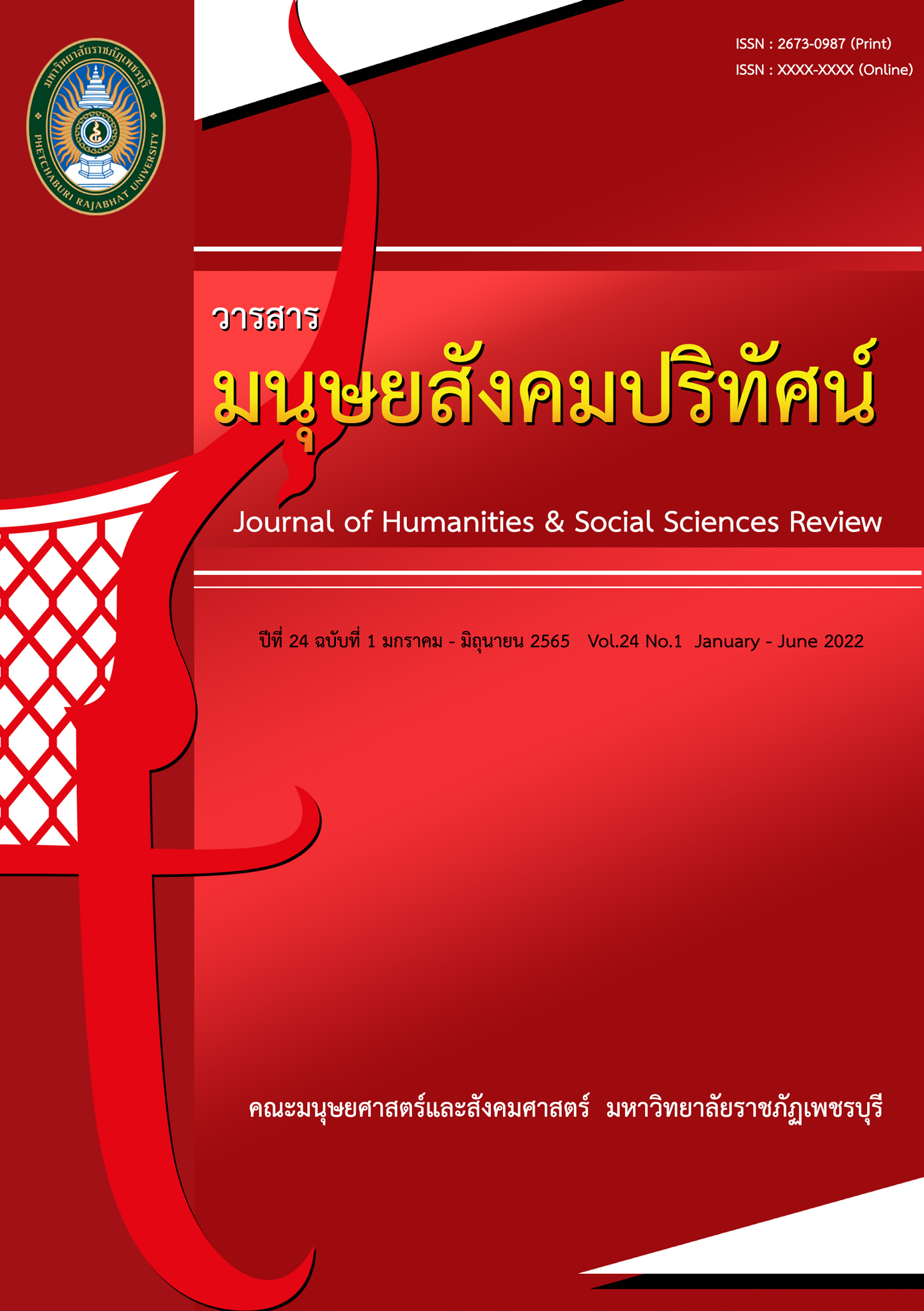The Development of Cultural Tourism of Route along of Thai Diaspora in Singkhon –Tanao Sri and Myeik Livelihoods
Main Article Content
Abstract
The development of cultural tourism routes for Thai Diaspora communities of Singkhon-Tanintharyi and Myeik aims to 1) study the potential of cultural tourism sites of Thai diaspora communities in Singkhon- Tanintharyi and Myeik and 2) develop cultural tourism routes of Thai communities, Singkhon-Tanintharyi Diaspora. The research methodology was divided into 3 steps. The first step was to study related documents and research. The second step was to study the potential of cultural tourism sites of the diaspora communities in Singkhon-Tanintharyi and Myeik. There are 21 informants who were the community leaders of the villages of Singkhon- Tanintharyi and Myeik. The methods for collecting information were surveying the area, non-participant observation and in-depth interviews, which included in-depth interviews, field notes and audio recordings. Verification of the credibility of the informants used a three-dimensional data validation method. The analysis of the data was based on content analysis. The third step was to develop cultural tourism routes for Thai diaspora communities in Singkhon-Tanintharyi and Myeik. The sample was 12 tourists which was obtained by specific selection. The research instrument was the tourist satisfaction survey on cultural tourism of the Singkhon-Tanintharyi and Myeik Diaspora Thai communities which was is a 5-level estimation scale with a confidence value of 0.891. The statistics used to analyze the data were mean and standard deviation. The results of the research indicate that: 1) 3 villages, Singkhon, Laem Yuan and Muk Phong have the potential for development into cultural tourism sites 2) there is a route classified appropriate for a 3-days cultural program. The tourist satisfaction assessment of the Singkhon-Tanintharyi and Myeik diaspora communities overall was at a high level.
Article Details
1. Any views and comments in the article are the authors’ views. The editorial board has not to agree with those views and it is not considered as the editorial board’s responsibility. In case, there is any lawsuit about copyright infringement, it is considered as the authors’ sole responsibility.
2. The article copyright belonging to Faculty of Humanities and Social Sciences, Phetchaburi Rajabhat University are copyrighted legally. Republication must be received direct permission from the authors and Phetchaburi Rajabhat University in written form.
References
กมลพิพัฒน์ ชนะสิทธิ์ และนรินทร์ สังข์รักษา. (2561). แนวทางการพัฒนาแหล่งท่องเที่ยวเชิงวัฒนธรรมตลาดน้ำคลองแดน อำเภอระโนด จังหวัดสงขลา. วารสารวิชาการมหาวิทยาลัยธนบุรี, 12(28): 163-176.
กฤษฎา ณ หนองคาย และสามารถ ปิติพัฒน์. (2556). การพัฒนาตัวบ่งชี้ปัจจัยที่มีอิทธิพลต่อนักท่องเที่ยวชาวไทยในการเดินทางท่องเที่ยวทะเลบัวแดง อำเภอกุมภวาปี จังหวัดอุดรธานี. วารสารวิชาการและวิจัยสังคมศาสตร์, 8(24) : 24-29.
กาญจนา บุญส่ง และคณะ. (2559). การพัฒนาเส้นทางท่องเที่ยวเชิงนิเวศประวัตศาสตร์ด่านสิงขร-มะริด ใน รายงานสืบเนื่องการประชุมวิจัย 3rd National and International Conference on Global Mobility through Ethnicity, Culture and Research 4 ธันวาคม 2559, ณ มหาวิทยาลัย ราชภัฏเพชรบุรี, หน้า 77-85.
กาญจนา แสงลิ้มสุวรรณ และคณะ. (2555). การท่องเที่ยวเชิงมรดกวัฒนธรรมอย่างยั่งยืน. วารสารนักบริหาร, 32(4): 139-146.
ไกรฤกษ์ ปิ่นแก้ว. (2556). แหล่งท่องเที่ยวเชิงวัฒนธรรม. สืบค้นเมื่อ 20 มกราคม 2563, จาก http://tourismsan1.blogspot.com/.
ทองใบ แท่นมณี. (2562). สิงขร-ตะนาวศรี: 30 ปีที่เปลี่ยนไป. ใน สยามในตะนาวศรี (หน้า 54-118). นนทบุรี: ต้นฉบับ.
พิมพ์ลภัส พงศกรรังศิลป์. (2557). การจัดการทรัพยากรท่องเที่ยวเชิงวัฒนธรรมของชุมชนอย่างยั่งยืน: กรณีศึกษาบ้านโคกไคร จังหวัดพังงา. วารสาร Veridian E-Journal, 7(3): 650.
ศิรินันท์ พงษ์นิรันดร และคณะ. (2559). แนวทางในการพัฒนาศักยภาพการจัดการท่องเที่ยวอำเภอวังน้ำเขียว จังหวัดนครราชสีมา. วารสารวิทยาลัยบัณฑิตการศึกษาการจัดการ มข., 9(1): 235.
Hawkins, J. (2007). The creative economy: How people make money from ideas. London: Penguin Bock.
Nzama, A.T., Magi, L.M., & Ngocoho, N.R. (2005). Workbook-1 tourism workbook for educators: 2004 curriculum statement (unpublished tourism workshop educational materials). n.p.: Centre for Recreation & Tourism, UZ. And Tourism KwaZulu-Natal, University of Zululand.


